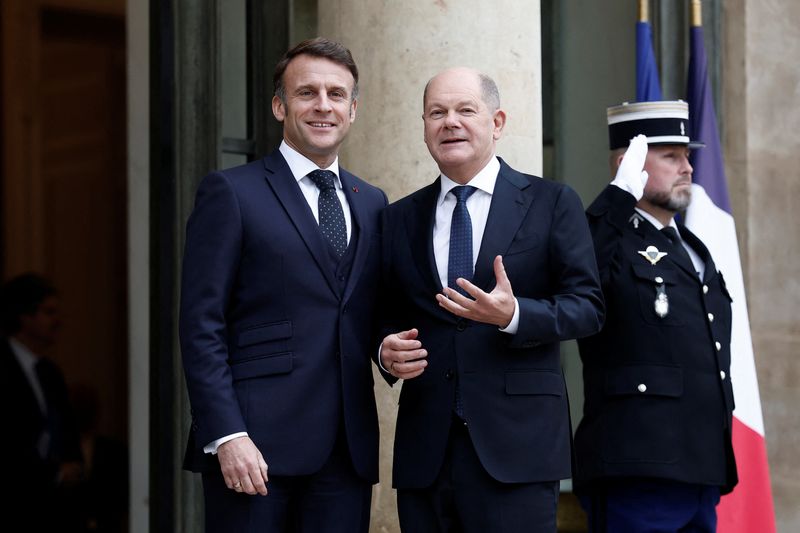By Andreas Rinke, Elizabeth Pineau
PARIS (Reuters) – French President Emmanuel Macron and German Chancellor Olaf Scholz sought to project unity at a meeting in Paris on Wednesday, as Europe struggles to respond with one voice to threats of tariffs of American President Donald Trump.
Trump, who has also threatened Canada, Mexico and China with heavy tariffs, said Tuesday that Europe had worrying trade surpluses with the United States and was “ready to impose tariffs.”
In statements to journalists before their working lunch at the Elysée, Macron and Scholz insisted that Europe was strong and the Franco-German tandem solid, while expecting difficulties.
“President Trump will, it’s already clear, pose a challenge,” Scholz said.
“Our position is clear. Europe is a vast economic area with around 450 million citizens. We are strong. We are united. Europe will not hide.”
Macron has long campaigned for Europe to be more autonomous.
“After the inauguration of a new administration in the United States, it is more necessary than ever for Europeans and our two countries to play their role in consolidating a united, strong and sovereign Europe,” he declared. .
Both leaders mentioned the steel, auto and chemical sectors – possible targets of US tariffs – as crucial to the European economy.
TRANSACTIONAL RELATIONS WITH Trump
Some business leaders and analysts said Trump’s first term proves that he often publicly issues threats of tariffs and other measures to use them as leverage, without ultimately carrying them out.
But others fear he will be emboldened by a strong popular mandate and increased support in both houses of Congress.
“The European Union is very, very bad to us,” Trump told reporters Tuesday. “They will therefore be subject to customs duties. This is the only way (…) to obtain fairness.”
Many EU countries have export-oriented economies. Already facing higher energy costs due to the war in Ukraine and slowing trade with China, they do not like the idea of a new front with the United States.
“We have entered a new phase of negotiations with the United States,” French government spokesperson Sophie Primas told reporters before the meeting. “The relationship with President Trump is transactional. We must be as determined as the United States, we must show our strength.”
Macron – who lost a snap election last year and has had four prime ministers in 2024 alone – and Scholz, who is trailing his conservative rival in polls ahead of next month’s German elections, are politically weakened in their country.
The two men have been at odds on many issues in recent years, slowing decision-making within the EU and leaving a leadership vacuum that European institutions have struggled to fill.

“Franco-German relations must warm up very strongly and very quickly,” said a French government source, speaking on condition of anonymity. “Europe will not be relaunched without a strong Franco-German couple.”
But as prominent German politicians push for a free trade deal between Europe and the United States, France says the EU must reject economic coercion and implement tariffs in case of attack.

